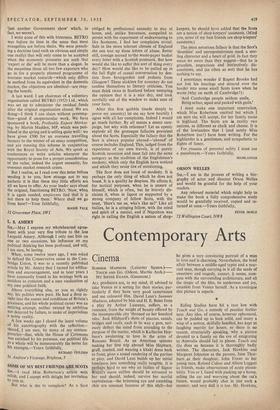SOME OF MY BEST FRIENDS ARE SCOTS Sia,—I read Miss
Robertson's article with relish, and I accept with delight her invitation to join in.
But who is she to complain? As a Scot obliged by professional necessity to stay at home, and, unlike Stevenson, compelled to persist with the experiment of endeavouring to like Scotsmen, I find her complaints trivial. Safe in the more tolerant climate of England she can tear up these letters of abuse. Better still, consign unread to-the waste-paper basket every letter with a Scottish postmark. But how would she like to suffer this sort of thing every day? How would she like to be 'pulled up in the full flight of casual conversation by den- tists from Invergordon and pedants from Glasgow? These sticklers for accuracy do not confine themselves to literary criticism. You must think twice in Scotland before venturing the opinion that it is a nice day, and look carefully out of the window to make sure of your facts.
After this first quibble (made simply to prove my ancestry) let me say how heartily I agree with all her complaints. Indeed I would go much further. By all means a smear cam- paign, but why with reticence? Let us openly explode all the grotesque fallacies prevalent about the Scots. Especially the fallacy that the Scot is always popular abroad—'abroad' of course includes England. This, judged from the experience of my own travels, is of purely Scottish invention and must fall into the same category as the tradition of the Englishman's modesty, which only the English have noticed and which they never tire of mentioning.
The Scot does not boast of modesty. It is perhaps the only thing of which he does not boast. It is a quality he despises. He affects it, for tactical purposes, when he is unsure of himself, which is often, but he bravely dis- claims it, when in liquor or supported by a strong company of fellow Scots, with the toast, `Here's tae us, wha's like us?' Like all bullies, he is a cringing fellow, with the mind and spirit of a menial, and if Napoleon was right in calling the English a nation of shop-
keepers, he should have added that the Scots are a nation of shop-keepers' assistants. (Mind you, some of my best friends are shop-keepers' assistants.) The most notorious fallacy is that the Scot's 'dourness' and unresponsiveness mask a ster- ling character and a heart of gold. In fact they mean no more than they suggest—that he is graceless, ungracious and instinctively dis- courteous, and (as often as not) that he has nothing to say.
I sometimes wonder if Rupert Brooke had not lost his bearings and strayed over the border into some small Scots town when he wrote (why on earth of Cambridge?): 'And Cambridge people seldom smile, Being urban, squat and packed with guile.'
I must make one important reservation, which Miss Robertson omitted but which I am sure she will accept, for her family name is highland. The Scots are in reality two nations, as different as chalk and cheese. It is of the lowlanders that I (and surely Miss Robertson too l) have been writing. For the highlander is a gentleman, and sympathetic to flights of fancy.
For reasons of personal safety I must use a pseudonym.—Yours faithfully, HIGHLANDER


































 Previous page
Previous page